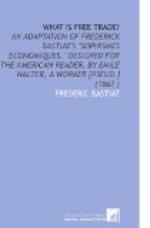Whether the protectionists wish it or not, it is not the less certain that the principle of restriction is the same as the principle of gaps, the sacrifice of the consumers to the producer, of the end to the means.
CHAPTER XVIII.
THERE ARE NO ABSOLUTE PRINCIPLES.
We cannot be too much astonished at the facility with which men resign themselves to be ignorant of what is most important for them to know, and we may feel sure that they have decided to go to sleep in their ignorance when they have brought themselves to proclaim this axiom: There are no absolute principles.
Enter the Halls of Congress. The question under discussion is whether the law shall interdict or allow international exchanges.
Mr. C****** rises and says:
“If you tolerate these exchanges, the foreigner will inundate you with his products, the English with cotton and iron goods, the Nova-Scotian with coal, the Spaniard with wool, the Italian with silk, the Canadian with cattle, the Swede with iron, the Newfoundlander with salt-fish. Industrial pursuits will thus be destroyed.”
Mr. G***** replies:
“If you prohibit these exchanges, the varied benefits which nature has lavished on different climates will be, to you, as though they were not. You will not participate in the mechanical skill of the English, nor in the riches of the Nova-Scotian mines, in the abundance of Canadian pasturage, in the cheapness of Spanish labor, in the fervor of the Italian climate; and you will be obliged to ask through a forced production that which you might by exchange have obtained through a readier production.”
Assuredly, one of the senators deceives himself. But which? It is well worth while to ascertain; for we are not dealing with opinions only. You stand at the entrance of two roads; you must choose; one of them leads necessarily to misery.
To escape from this embarrassment it is said: There are no absolute principles.
This axiom, so much in vogue in our day, not only serves laziness, it is also in accord with ambition.
If the theory of prohibition should prevail, or again, if the doctrine of liberty should triumph, a very small amount of law would suffice for our economic code. In the first case it would stand—All foreign exchange is forbidden; in the second, All exchange with abroad is free, and many great personages would lose their importance.
But if exchange has not a nature proper to itself; if it is governed by no natural law; if it is capriciously useful or injurious; if it does not find its spring in the good it accomplishes, its limit when it ceases to do good; if its effects cannot be appreciated by those who execute them; in one word, if there are no absolute principles, we are compelled to measure, weigh, regulate transactions, to equalize the conditions of labor, to look for the level of profits—colossal task, well suited to give great entertainments, and high influence to those who undertake it.




